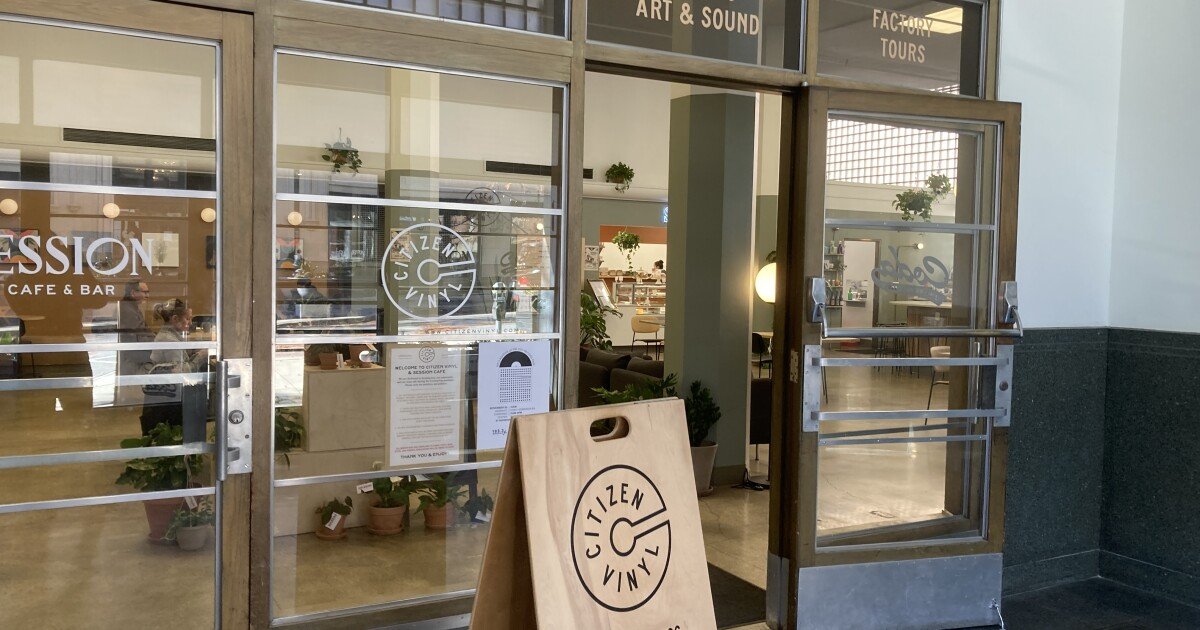Pressing Business: Asheville's Citizen Vinyl Curates Community – WMOT
The historic comeback of vinyl records has entered its second decade, so nobody can claim anymore that it’s a temporary blip or a passing fad. More than 19 million new LPs sold in the first six months of 2021, roughly twice as many as the prior year. And that would be fantastic news for music and the business if only vinyl manufacturing wasn’t stressed to its breaking point. There are only so many record presses worldwide, and industry estimates suggest they’re meeting only about half of the potential demand. Artists and labels have seen wait times for LP pressing runs slip from four months to eight months to more than a year in many cases.
At last, we’re seeing new entrants into the record pressing business and new presses coming on line. In Asheville, NC, a new operation stepping in to meet the demand is going far beyond stamping hot PVC into 12-inch records. Citizen Vinyl is its name, and its mission touches recording, live music promotion, public education, visual art, record commerce, gourmet food, historic preservation, architecture, and quality cocktails. This all sounded great. So before Thanksgiving, I paid them a visit.
At the center of this story is an office building, 14 O Henry Ave. in downtown Asheville NC. Since it opened in 1939, it was and is home to the Asheville Citizen Times newspaper, but newspapers are an analog technology that’s not faring as well as vinyl, so its printing operation moved out and the editorial department has retreated from the big ground level newsroom to offices on the second floor. What to do with the vacated space, with its sleek Art Moderne design, 20-foot ceilings and abundant natural light? Strangely, amazingly, the building suited the needs of a company being set up by a music producer with a yearning to make records and support his community.
He is Gar Ragland, a North Carolina native whose career has taken him to the northeast and back. He was a songwriter and artist based in Charlottesville, VA in his college years. He studied at the New England Conservatory of Music, transitioned into record production and founded New Song Music, with a label and the New Song Contest, which just celebrated 20 years. He meets me in the lobby and starts our tour in the historic foyer of the Citizen Times building.
“The first thing you see when you walk in. it’s a terrazzo map of western North Carolina,” he says. The map isn’t just on the floor. It is the floor, with the counties inlaid in different colors of local granite. “These are the 13 counties in that the newspaper served.”
I have personal history here, because as a graduate student at Duke University in the early 90s I came through these doors for a job interview, and this map blew me away then. I’m glad it’s still there. Then, through the doors, was the cacophony of reporters at desks and copy editors marking up galleys. Now, the space is serene, bright, and set with tables and couches for the public to hang out. Service comes from a farm to table café and “vinyl themed” cocktail bar called Session, where the bartenders play albums on turntables all the way through, side A and side B, all day. Hanging on the wall are the programming team’s daily music menus, printed up as it were the chef’s specials. Adjacent to the horseshoe shaped bar is a vinyl record and art store with new and used releases, plus show posters and lithographs.
But the real catalyst for this expansive Citizen Vinyl business dominates one end of the room. “We’re looking through the big glass window at our vinyl pressing facility where we have two presses and we’re making records 7 days a week 12 hours a day,” Ragland says. He guides me and my companions into the room where an automated press and a manual press are humming and chuffing side by side. The manual press goes slower but lets the operator reach in to manipulate the warm vinyl pucks to mix colors or throw in splatter effects.
Two presses don’t add up to an especially high throughput operation, but Citizen Vinyl has a third machine on the way to be installed in February. And Ragland says they’ll scale up over time to meet demand. However many presses there are, they’ll be under the direction of Operations VP Peter Schaper. He is a native of Germany and a veteran of manufacturing physical music and video formats. Soon after he launched his career in record pressing in the 80s, colleagues started telling him about this new thing called the CD. And everything changed.
“One of my last jobs in vinyl was to close a facility in Germany which had over 120 presses,” Schaper told me. “And we sold those for seven dollars a metric ton, scrap metal. It all went into a scrapyard.”
Now the industry would love to have those scrapped presses back.
“I talk to customers every day and apologize that we cannot take the order on. And when they ask when can you, I say what about in six months?” Schaper says. “I don’t like to tell a customer we cannot do it (quickly), but it’s a better problem to have not enough capacity than to have no customers.”
Before I go, I asked Schaper about who he found to work here, and his answer revealed something about the DIY culture of Asheville. He told me they put a help wanted ad on social media. “The next day we had about 30 emails at 8 in the morning,” he said. “I looked into it and said well nobody has industrial experience. Then I thought a little different. And we found a lot of people who like music, who are making music, who play instruments, who are very attached to music, and especially to vinyl. So we changed the concept. We brought people in who had no clue what to do and we started training the people. (So) we have people with a strong passion for the product. It’s a good fit.”
Citizen Vinyl isn’t only about pressing music in grooves and selling records. There’s a creative side too. Ragland shared with me some tracks he recently produced by Nashville based songwriter Jobi Riccio in the operation’s recording studio. And that studio was made possible by a stunning surprise during the renovation of the Citizen Times building, the original studios of historic WWNC on the building’s third floor.
“None of on the team were aware that this radio station even existed. It had been used as a storage room and conference area for the newspaper,” Ragland said. “The landlord was just days away from demoing the whole shell of the studio. And he mentioned it to me as an afterthought.”
WWNC, call letters alluding to “Wonderful Western North Carolina,” was founded in 1927. Only 1,000 watts before the end of WWII, the altitude of Asheville gave its signal a mighty reach, and it became a hotspot for musical residencies in the 20s and 30s, including country music pioneers Jimmie Rodgers and Bill Monroe. The Citizen Times newspaper purchased the station and moved it to two top floor studios, where it broadcast music and news for decades. The sound treated spaces completed the vision of what Ragland calls a musical ecosystem.
“I come to this project as a music producer, and it had always been my dream that wherever we ended up, whatever part of town, that I would have an opportunity to build out a mixing and postproduction room,” he said. But this space made a lot more possible – a large studio for tracking and a period-perfect Studio A for the recording equipment. Its light fixtures, sound treated walls and decorative tile floor are all authentic to the period. “We just inherited this architectural treasure of a space. For me at least, it’s palpable in here. You can look at the original floors and you can see all of the pockmarks and the scuffs. These are the feet of bass instruments and cellos and mic stands and women’s high heels. You definitely feel the history.”
And as completing a circuit, the recording gear is tied in to Citizen Vinyl’s first floor lobby where they host live acts and community talks. Ragland described a recent multi-media lecture by rock and roll historian Bill Kopp – an Asheville resident – about the Beatles sessions recently documented in the film Get Back. “It was awesome. We had people who were 17 years old up to 87 years old. So we really want to cultivate sort of a salon or parlor vibe if you will, where you can come and have a great cocktail or an espresso drink and some great food and sit down and listen to great music with other members of your community and talk and learn and celebrate together.”
Where there were printing presses, there are now record presses. Where there were reporters and editors, there is now public conversation. And numerous reminders of what it means to be a citizen.
Thanks to Asheville’s Molly Driessen and Danielle Dror for help with supplementary photography and audio recording. To find out more about Jobi Riccio, winner of Ragland’s 2019 New Song Music Competition, see her website here.



